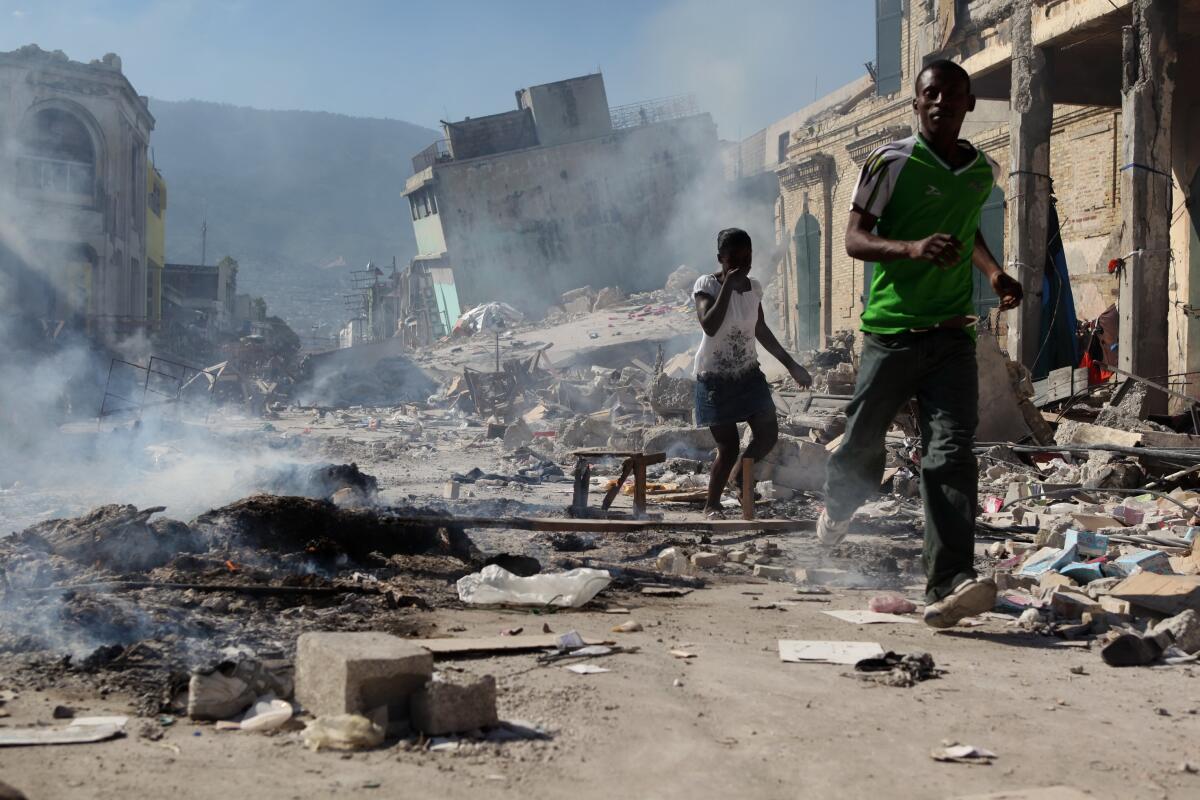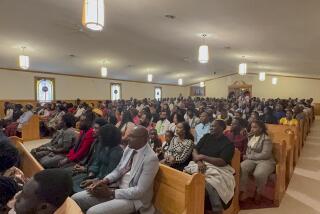Opinion: Helping one child at a time in Haiti 10 years after the devastation

- Share via
PORT-AU-PRINCE, Haiti — It’s been 10 years since Haiti suffered the magnitude 7.0 quake that killed over 300,000 of its people and left more than a million displaced. The scale of the destruction left the Haitian economy, its government and daily life indelibly changed.
Rubble lined the streets for years. Businesses never reopened. Temporary refuge centers became permanent housing. And it was only in October that the United Nations finally pulled out, leaving behind a checkered legacy that included accusations of violence and sexual abuse, and a cholera epidemic.
Since the U.N.’s departure, waves of protests against corruption and the Haitian government have crippled daily life, shut down schools, closed stores and sent many of those willing to help packing, seeking safer places to make a difference.
As usual, the victims of all this are the people, particularly the children. “An empty sack can’t stand up” is a Creole saying. I have been witness to this empty sack for Haiti’s kids for the last 10 years. Although I am better known as an author, I also operate an orphanage/boarding school called the Have Faith Haiti Mission in Port-au-Prince and have admitted 46 needy children in that time, while turning away at least 300 other kids for lack of space.
Their stories astonish. A little boy left to die under a tree when he was weeks old. Another dropped at a malnutrition center, with no one ever returning for him. Children living in mudholes under the remains of a hurricane-tossed tin roof. Children scratching by for years in tent cities, with no electricity, no running water, and latrines at least a football field’s distance from where they slept.
These children know nothing of corrupt politics or misguided policies that have sunk Haiti for two centuries. They simply need help. In the early years after the earthquake, when aid was offered, commercial flights to Haiti were often filled with energetic teens and college kids, wearing colorful T-shirts with slogans about helping Haiti, loving Haiti, not forgetting Haiti.
But lately those groups have withered, frightened by the violent protests in the streets. Last week, Delta airlines halted its service to Haiti, citing “soft demand.” The threats of random violence have been real, from the well-reported incident of a French couple murdered during an adoption trip in November to countless undocumented crimes that are part of daily life.
I can understand the reticence. I work at the orphanage up to a week every month, and have for the last 10 years. From inside our gates, we hear gunshots at night. Our schoolteachers have had to wear street clothes to work, because protesters threatened to harass any uniformed teacher they saw.
On a ride from the Toussaint Louverture airport to our orphanage in December, an angry group of protesters, wandering down a major street, spotted our van. Since we were the only thing coming or going on that block, they decided to rush it. A huge rock was thrown at the windshield. In an instant, men were screaming and jumping on the hood and the roof and the grabbing at the doors.
Fortunately, when our mission’s Haitian director jumped from the car and screamed that we were with an orphanage and were only trying to get to our children, the anger subsided, and in time the protesters merely rode on our vehicle as we continued on, past burning tires and closed shops. The men screamed at no one in particular. I think they just wanted their voices heard.
This situation makes it tough to operate any agency. But it also makes it imperative to keep going — not least because the United States has a particular connection to Haiti.
For one thing, Haiti is less than 700 miles from Miami. The U.S military occupied Haiti for nearly 20 years, from 1915-1934, so our footprints are in its sand. And as a nation proud of ending slavery, we should respect Haiti’s birth after the world’s first successful slave revolt in 1804 and its establishment as the first independent black republic. It has been paying a price for that ever since.
But if history doesn’t move you, compassion should. Haiti’s poor, particularly the children, are greatly reliant on the aid of those willing to give their time and presence. Haiti’s infant mortality rate remains at nearly 54 deaths per 1,000 live births, almost 10 times the rate in the U.S. Six out of 10 people live on less than $2.41 a day, many with no access to clean water or transportation. Those numbers scream for help.
And help is needed more now than at any time since the earthquake itself. You can feel a different trembling in Haiti these days, a fear of an uncertain future and continued destabilization. Ten years ago, seemingly everyone wanted to pitch in. But now, attitudes have changed. There is cynicism toward Haiti and its government. There are questions, many of them fair, about what happened to the billions of dollars in aid that were sent after the earthquake. Worse, there seems to be a weariness in helping a nation that seems perpetually to need assistance.
Let’s hope the earthquake photos rerun on this anniversary will rekindle our urge to help and remind us of the life-changing magnitude of that catastrophe. We may have the luxury of forgetting. Haiti and its children do not.
Mitch Albom is the author, most recently, of “Finding Chika: A Little Girl, an Earthquake, and the Making of a Family.” He operates the Have Faith Haiti orphanage in Port-au-Prince.
More to Read
A cure for the common opinion
Get thought-provoking perspectives with our weekly newsletter.
You may occasionally receive promotional content from the Los Angeles Times.










